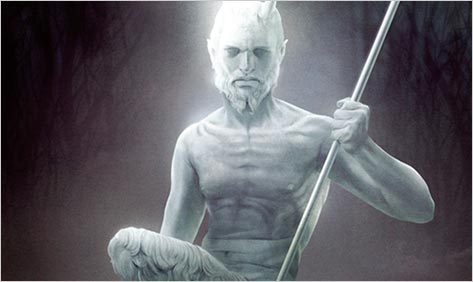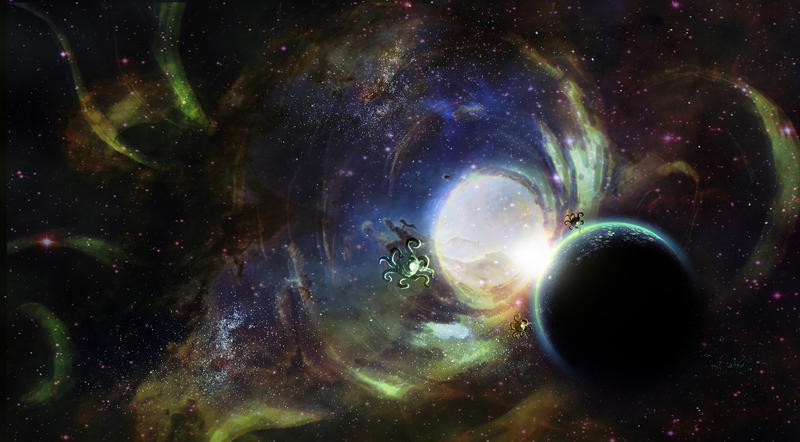Reading through Machen's "The White People and Other Weird Stories", I can't help thinking about how different contemporary fiction is from classic Weird Fiction. The major Weird authors had strong beliefs about the world, which look anachronistic by today's standards. And yet, those beliefs give their fiction an power and an energy that most current fiction lacks. Let's take a look at a few examples of Weird Authors and their major messages:
Arthur Machen
A Christian mystic, Machen viewed the growing materialism of the Modern era with great unease. His works reveal the hidden realms of the holy and the profane hiding behind the facade of everyday life--realms in which Machen really believed. His novella A Fragment of Life is a particularly subtle yet effective example of this.
Another of Machen's themes is distrust of Science and it's Irreverent outlook on sanctity and morality. From this mindset grew his most well-known horror story, The Great God Pan.
Robern E. Howard
Howard, like Machen, was also unhappy with Modernization, but for entirely different reasons. Growing-up in various towns in the State of Texas, Howard saw a growing contrast between the previous generation's tales of the Texas Frontier and the increasingly urbanized existence spreading across the continent. This feeling of being closed-in and confined by Urbanization gives Howard's stories their unmatched energy. Writing was this author's escape, and he approaches it with all the gusto of an inmate fleeing his prison. In Howard's writing, everything is larger than life, but written with the complete conviction that this is how real life is meant to be.H. P. Lovecraft
Ah, Lovecraft. There's a lot to say about Lovecraft, but one of his major themes is that the universe we live in is ambivalent, if not hostile to Human life. The idea that, if we're unfortunate enough to encounter some of the strange forces or denizens out there in the Cosmos, then Humanity's short history will come to an abrupt end.Another of Lovecraft's themes is building horror on the back of our xenophobia. People have a fear of The Stranger which borders on the instinctual. From what I understand, Lovecraft expresses a fear of the influx of immigrants into his native New England in some of his correspondences. I would suggest that it is this very bias that injects such strangeness and repulsion into his descriptions of the denizens of Innsmouth and the "mixed-blood" sailors in "Call of Cthulhu".
This is Why We Can't Have NiceWeird Things
Now, you might rightly accuse me of being a post-modernist windbag, describing these excellent authors as the mere sum of their individual beliefs and biases. Could be.
At the same time, I think there is something here. You don't hear so many authors in our age giving such succinct theories of the world around them. There was something about the turn of last century, a certain confidence in our ability to sum-up the world with one well-thought-out theory, that doesn't exist today.
Society was reaping the economic rewards of modernism and industrialization, science fiction was turning out hyper-optimistic prophecies of rationalist utopias, and political theory was inventing systems, like Communism and Fascism, to create just such utopias. The world seemed so much more black and white back then, and the classic weird authors, products of their time, had their own well-crafted theories about what was wrong with the world. Their outlooks, in today's context, come-off as naive at best or chauvinistic/racist at worst. That said, their world-views gave their writings a power that remains unmatched till this day.



I think many modern authors just prefer to keep their personal views a secret, maybe because the world is so full of "trollish" behavior and general vitriol for anything the general populous deems unrational.
ReplyDeleteIt would seem we have a few writers that express their world views through writing though, Neil Gaiman comes to mind, he's a bit of an odd bird with his own thoughts on reality. He also has a weird thing for cats.
Terry Goodkind of course is one of those guys that ooze with their own philosophy on reality, He seems to have connections with Ayn Rand and her pseudo-philosophy.
One might claim Steven King, but personally I think the guy is a hack, dancing on the graves and past endeavours of better horror/weird writers.
Mike Mignola is a master of weird, at least to me. The guy does some incredible work and his nods to the Mythos is outstanding, weird personally, I don't thik so. HOWEVER Alan Moore, now that guy gets weird and is weird and has his very own unique world view.
I think they are out their, the ones that have picked up the mantle, but they are reclusive, maybe a little to much in our rational and sterile world of skepticism and logic. Sad to be truthful. I think we as a society do much to crush the weird and the odd.
Science and Religion have one thing in common, if it doesn't fit their mold, kill it, burn it with fire.
Awesome post BTW, made me think, and kinda pine for days I never saw.
So you're saying that modern authors potentially have the same sorts of world-views, but just don't like to insert them into their writing. You make a good point--I accept that's also a significant factor.
DeleteAt the same time, look at some of the ideologies of the above authors with modern eyes. Like Howard's Euro-Centrism. Like take a look at this quote from Wings in the Night. It's not just an issue of racism. It sounds literally ridiculous to modern ears having lived through two world wars, globalization, multi-culturalism. Like, really--you think skin color makes him a better fighter? Do you follow pro-boxing?
"Kane stood, an unconscious statue of triumph--the ancient empires fall, the dark-skinned peoples fade and even the demons of antiquity gasp their last, but over all stands the Aryan barbarian, white-skinned, cold-eyed, dominant, the supreme fighting man of the earth, whether he be clad in wolf-hide and horned helmet, or boots and doublet—whether he bear in his hand battle-ax or rapier—whether he be called Dorian,
Saxon or Englishman—whether his name is Jason, Hengist or
Solomon Kane."
Or consider Machen's relatively tame mysticism/occultism. Today, these sorts of views are considered much more nutty than they were back then, because we've delved so much deeper into the sciences by now, without finding any goblins or demons. At best a religious person today could see Machen's writings as a parable for spiritual experience, but at the time, his stories made a reasonably compelling argument for his beliefs.
A cool blog post! Yeah, weirdness is personal and their philosophy makes the weird stand out.
ReplyDelete